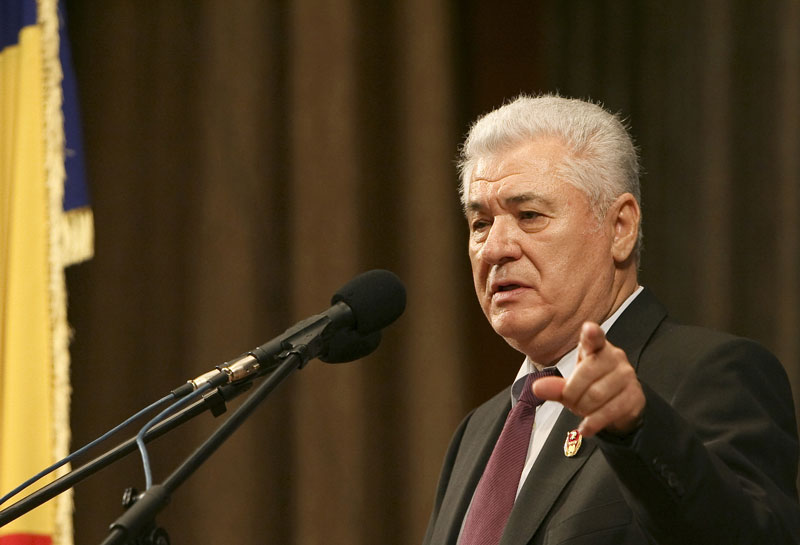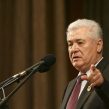
Moldovan Parliament Struggling to Elect Head of State
Publication: Eurasia Daily Monitor Volume: 6 Issue: 97
By:

Moldova’s newly elected legislature convened for its first full-fledged sitting on May 12 and elected the outgoing head of state, Vladimir Voronin, as Chairman of Parliament. Having completed two presidential terms (2001-2009), and barred by the constitution from seeking a third, Voronin continues as acting head of state pending the election of his successor and as leader of the nominal Communist Party for the foreseeable future.
The vote in parliament reflected the acute polarization of political forces within and outside the chamber. None but the 60 communist deputies voted for Voronin and two Vice-Chairmen from the same party (Moldpres, Basapres, May 12). The first Vice-chairman, Vladimir Turcan, is a Transnistria native and retired interior ministry general -sharing the same background as Voronin on both counts. The second Vice-Chairman, Grigore Petrenco (nominally an ethnic Ukrainian) is a young polyglot Euro-leftist connected with marginal left-wing groups within European inter-parliamentary bodies.
The opposition’s 41 nominally liberal deputies (16 Liberals, another 16 Liberal-Democrats, and 9 from Our Moldova) do not recognize the legitimacy of the April 5 election results, demand new elections, and participate only minimally in the parliament’s work thus far. The three opposition parties have turned down the majority party’s offer of a vice-chairmanship of parliament and five (out of 12) committee chairmanships, including: foreign policy and Euro integration, defense and state security, and the human rights committee. All these posts remain vacant, and at the opposition’s disposal.
The legislature will attempt to elect a new head of state on May 20 and has until June 7 to do so, in a maximum four rounds of balloting, requiring at least two candidates in each round. The parliamentary majority’s 60 votes fall one vote short of the constitutionally required minimum of three fifths -that is, 61 votes- to elect the head of state in the 101-seat chamber.
The three opposition parties refuse to participate in this election in any form. This behavior is consistent with the opposition’s declared goal to frustrate the presidential election, force the parliament’s dissolution and new elections (see article above). Speculation abounds, however, regarding political deals with opposition deputies or outright vote-buying to garner the minimum necessary of 61, or the more decent 62 or 63 votes.
The majority party’s presidential candidates are the incumbent Prime Minister, Zenaida Greceanai, and a neurosurgery professor as a pro-forma contestant. Neither of them is a communist party member. Greceanai (née Bujor), born in 1956 in Siberia to a family of Moldovan deportees, is a respected finance and budget expert, long-serving finance minister in 2002-2008, and prime minister from March of last year to date. Based on the stable communist parliamentary majority, the Moldovan government includes only two members of that party among the cabinet’s 19 members.
Voronin controls the parliamentary majority with two firm hands as parliamentary chairman and party leader. On May 13 Voronin announced his decision to propose Marian Lupu for the post of prime minister. The majority party has sufficient votes in the chamber to approve the nomination (Moldpres, Basapres, May 13).
Lupu was chairman of the 2005-2009 parliament and prior to that, Economics Minister during the recovery years 2003-2005. Uniquely among Moldova’s active politicians he is fluent in English and French as well as speaking the standard literary Romanian. Lupu, born in 1966, entered Parliament in 2005 on the Communist Party’s slate as a non-party member and was immediately elevated by Voronin’s team to the parliament’s chairmanship, as part of efforts to Europeanize the face of Moldovan politics. The Communist parliamentary majority required Lupu to become a party member in return for electing him as chairman. Many in the party do not regard him as one of their own. By the same token Lupu enjoys the respect of otherwise reflexively anti-communist circles in local civil society.
Greceanai, Lupu, and Petrenco have an ally in Voronin’s top adviser, Marc Tcaciuc, who is now transitioning with Voronin from the presidency to a parliamentary front seat. He remains close to Voronin both in parliament and in the party leadership bodies, which Tcaciuc has sought with mixed results to reform and rejuvenate. Of the nominations approved and announced in the last few days, only Turcan belongs to a different team. This includes some of the law-enforcement chiefs with unreformed views and isolationist tendencies as well as the incumbent Minister of Foreign Affairs, Andrei Stratan, who harbors presidential ambitions of his own.




